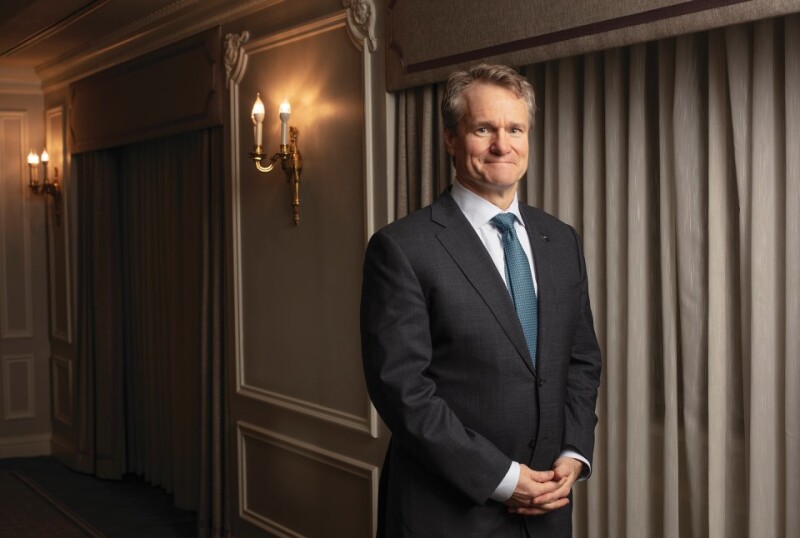
Support for stakeholder capitalism, which has been growing louder over the past few years, has become a clarion call in 2020. Covid-19 has revealed how large sections of society are just one pay cheque away from homelessness, poverty or hunger.
In May, the death of George Floyd in the US further deepened awareness of inequality along racial lines; while climate change led to the worst wildfires in decades ravaging Australia, and more recently California, and the Arctic recording its highest temperature on record.
The financial sector has been steadily moving towards greater commitment to society and planet, but without a leader of a global institution taking the reins it was doubtful if stakeholder capitalism would move beyond rhetoric. This year, however, a leader emerged: Bank of America’s chairman and chief executive Brian Moynihan. As crisis after crisis has materialized, Moynihan has been out front showing how the financial industry can respond and why stakeholder capitalism is not only needed but works.
Moynihan was perhaps the obvious candidate for this leadership role. When he took the helm at Bank of America after the global financial crisis, his ‘responsible growth’ strategy had at its heart the creation of a great place to work for employees, while at the same time serving both shareholder interests and communities. This was a different approach to that of his peers.
“From the first time we met, Brian struck me as an extraordinary business leader, with the heart in the right place,” says Klaus Schwab, chairman of the World Economic Forum (WEF). “In a corporate world still largely driven by money and profits, he always stood out as a big believer in a more socially and environmentally driven approach instead.”
From the first time we met, Brian struck me as an extraordinary business leader
At Davos at the beginning of 2020, Moynihan, who is chair of the WEF’s International Business Council, brought the entire private sector to the table to develop a set of environmental, social and governance metrics and disclosures that could be adopted by companies across every industry sector worldwide. It was a watershed moment, and while there were concerns that the momentum would be lost when Covid-19 hit, Moynihan says those concerns were short-lived.
“We realized we have to maintain the momentum on stakeholder capitalism as it will guide how we think about building back,” he says. “We’re all working towards a common goal be that teammates, shareholders, mainstream investors and regulators.”
That common objective was the adoption of the UN’s 17 sustainable development goals.
Of all the chief executives of large US banks, it is Moynihan who has been most visible throughout the Covid-19 crisis. His responsiveness has brought confidence to both consumers and the global investment community. The responsible growth strategy he put in place at BofA has also meant the bank has been able to navigate the crisis smoothly.
“We saw Covid-19 was a health and humanitarian crisis and had an instinct it would also be an economic crisis,” says Moynihan. “So we started taking action along the same lines of our responsible growth strategy – caring for our employees first, then clients and then our communities.”
Actions taken, such as providing financial assistance to employees, ensuring the US federal government Payment Protection Program funds reached those who needed them, and issuing a $1 billion social bond and committing extra philanthropic dollars to communities, all contributed to BofA also receiving Euromoney’s award this year for the world’s best bank for corporate responsibility.
Recovery
Although the bank’s consumer banking business has naturally been hit by the pandemic, its second-quarter earnings, bolstered by the capital markets business, beat analyst expectations and BofA ended the quarter with record deposits of $1.7 trillion, $242 billion in common equity and $21 billion in credit reserves.
Now Moynihan is optimistic that the US economy at least is on its way to recovery – albeit one that “may take all of 2021 and most of 2022 to get back to pre-Covid levels.”
“The good news is that the financial support of our industry, central banks and their fiscal stimulus has worked,” he tells Euromoney.
With many businesses and individuals having “crossed the river”, future stimulus and capital needs to be aimed at those that haven’t, he says – businesses and employees in industries such as travel, the arts, sports, restaurants and entertainment.
The good news is that the financial support of our industry, central banks and their fiscal stimulus has worked
Since May, Moynihan has also been leading on another front: the fight against systemic racism. BofA is known for its commitment to diversity and inclusion (D&I), and Moynihan chairs the bank’s D&I council. In June, BofA announced a four-year $1 billion commitment to create opportunities for people and communities of colour.
“After the killing of George Floyd, we knew we had to do more – to really put our money where our mouth is. To finance education, jobs, up-skilling, housing, healthcare, to work with entrepreneurs in communities of colour beyond the $1 billion in lending to CDFIs [community development financial institutions], but as a direct investment,” says Moynihan.
The bank also made a $25 million commitment towards the launch of a new Smithsonian Institution initiative to ensure the progress towards racial equality continues.
